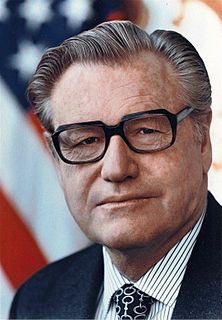A Quote by Arthur Miller
A friend of mine once said that there were only two truly national events in the history of the United States. One was the Civil War and the other one was the Depression.
Related Quotes
During a single week of July 1967, 164 Americans were killed and 2100 were wounded in city riots in the United States. We are truly fighting a two-front war and doing badly in both. Each war feeds on the other and, although the President assures us that we have the resources to win both wars, in fact we are not winning either.
In the middle of the nineteenth century, the United States embarked on a new relationship with death, entering into a civil war that proved bloodier than any other conflict in American history, a war that would presage the slaughter of World War I's Western Front and the global carnage of the twentieth century.
In the Islamic world, the U.S. is seen in two quite different ways. One view recognizes what an extraordinary country the U.S. is.The other view is of the official United States, the United States of armies and interventions. The United States that in 1953 overthrew the nationalist government of Mossadegh in Iran and brought back the shah. The United States that has been involved first in the Gulf War and then in the tremendously damaging sanctions against Iraqi civilians. The United States that is the supporter of Israel against the Palestinians.
History of America, Part I (1776-1966): Declaration of Independence, Constitutional Convention, Louisiana Purchase, Civil War, Reconstruction, World War I, Great Depression, New Deal, World War II, TV, Cold war, civil-rights movement, Vietnam. History of America, Part II (1967-present): the Super Bowl era. The Super Bowl has become Main Street’s Mardi Gras.
President Kennedy has named two Negroes to District Judgeships and appointed Thurgood Marshall to the United States Court of Appeals. When I came to the Department of Justice, there were only ten Negroes employed as lawyers; not a single Negro served as a United States Attorney - or ever had in the history of the country. That has been changed.
The division of the United States into federations of equal force was decided long before the Civil War by the high financial powers of Europe. These bankers were afraid that the United States, if they remained in one block and as one nation, would attain economic and financial independence, which would upset their financial domination over the world. The voice of the Rothschilds prevailed... Therefore they sent their emissaries into the field to exploit the question of slavery and to open an abyss between the two sections of the Union.
Because the US has control of the sea. Because the US has built up its wealth. Because the US is the only country in the world really not to have a war fought on its territory since the time of the Civil War ... Therefore we can afford mistakes that would kill other countries. And therefore we can take risks that they can't ... the core answer to why the United States is like this is we didn't fight World War I and World War II and the Cold War here.
The United Nations, he told an audience at Harvard University, 'has not been able-nor can it be able-to shape a new world order which events so compellingly demand.' ... The new world order that will answer economic, military, and political problems, he said, 'urgently requires, I believe, that the United States take the leadership among all free peoples to make the underlying concepts and aspirations of national sovereignty truly meaningful through the federal approach.'
It is truly vital for the United States to assure that it is not attacked with weapons of mass destruction; to prevent wars in other countries from spreading onto American soil; and to maintain access to global sea lanes on which our economy depends. Beyond that, there is little or nothing in the world that should draw the United States to war.







































